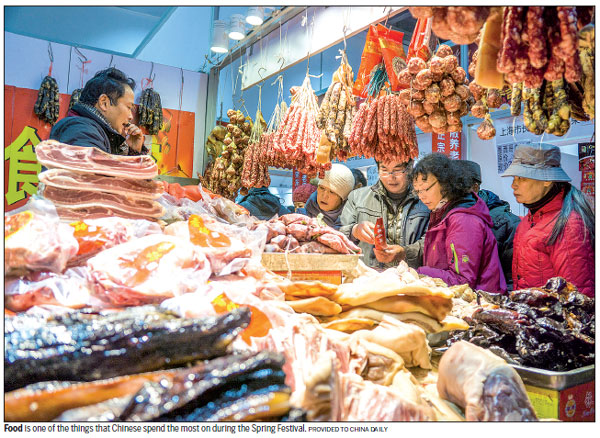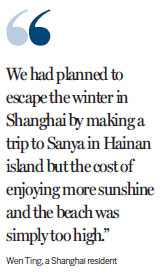Burning a hole in the wallet

The Lunar New Year is more than just an important occasion when the entire family reunites - it is also the most expensive event of the year for some Chinese
While many Chinese would complain about having eaten too much during the Lunar New Year holidays - feasting is after all a key part of the festivities - others would lament about how their wallets have drastically lost weight.
Latest data by China's Ministry of Commerce shows that retailers and restaurants across the nation generated about 840 billion yuan ($122.03 billion) in revenue, up 11.4 percent year-on-year, during the seven-day Chinese New Year holiday this year.
According to a report by China UnionPay, the nation's largest bank card payment processor, its customers made as many as 343 million swipes of their bank cards during the festivities, amassing a total expenditure of 462 billion yuan, a year-on-year rise of 11.7 percent and 48.1 percent respectively.
Chen Han, a data analyst from China UnionPay, said that shopping, dining and travel make up most of the transactions.
Shopping
The effervescent e-commerce market in the country has no doubt been a major factor behind the rise in spending. Consumers today have a wealth of options to choose from when shopping for New Year essentials such as food, gifts and home decorations.
According to Euromonitor, the high proliferation of smart phones in the country has been key to e-commerce's growth. It reported that mobile e-commerce consumption in the country had spiked about 80 percent from 970 billion yuan in 2015 to 1.75 trillion yuan in 2016.
"I bought products from across the nation, such as hotpot ingredients produced in Sichuan province, seafood from the coastal city of Dalian in Liaoning province and snacks made in Xiamen in Fujian province and Macau," said Wen Ting, a Shanghai resident.
"I have no idea how much I've spent for the New Year, but I'm sure I've spent even more than what I did during the Singles' Day sales," she added.
Shopping online also means that consumers get to enjoy the convenience of home delivery. As many as 13.75 million packages were delivered across China during the Chinese New Year holiday, a 19.86 percent rise from last year, according to the State Post Bureau.
Data from Cainiao, the logistics arm of Alibaba Group Holding Ltd, shows that most of the packages were delivered to major cities such as Shanghai, Beijing and Guangzhou.
Liu Hui, director of public relations at JD.com, one of the largest e-commerce platforms in China, said that the volume and value of orders placed on its site this year was twice that of last year.
According to Liu, Chinese consumers have maintained a strong interest in fresh food items, with the most searched products being steak, cherries, shrimp, dumpling, sea cucumber, seafood and fruit. The top three products bought during the Chinese Spring Festival were wines, seafood and fruit.
Dining
While Chinese families traditionally gather at the homes of their loved ones for a time of feasting, many also choose to celebrate the Lunar New Year at restaurants.
"Our family had the New Year Eve's dinner at a local restaurant instead of preparing all the food ourselves, saving us both time and energy. We usually have to prepare for the dinner several days in advance," said Lu Bin, whose family has spent the past two reunion dinners in restaurants.
This year, about 400,000 families booked their New Year's Eve dinners through Koubei, an online-to-offline e-commerce platform backed by internet giant Alibaba Group Holding.
The restaurants that were open during the holiday saw 30 percent more orders than usual, according to Koubei.
Data by Koubei showed that only one-tenth of the restaurants were open during the Chinese New Year holiday as most restaurant staff returned to their hometowns to be with their families. However, there were still about 20,000 dining establishments in Shanghai that people could go to, the most among Chinese cities, followed by Beijing and Guangzhou.
An increasing number of Ctrip customers are having their reunion dinners in restaurants too - 47.9 percent of consumers did so this year, a year-on-year increase of 15 percent. Data from the Ctrip Gourmet List data also shows that the average spending per person for the dinner was 279 yuan in China and 352 yuan abroad.
Travel
Embarking on a short getaway is a similarly expensive endeavour during the festive period. Wen said that she had to shelf her travel plans because the prices during the Lunar New Year were too prohibitive.
"We had planned to escape the winter in Shanghai by making a trip to Sanya in Hainan island but the cost of enjoying more sunshine and the beach was simply too high. In the end we drove to the surrounding Zhejiang and Jiangsu provinces instead," said Wen, who added that hotel prices were as high as three times the usual rates.
According to UnionPay, the number of transactions related to transportation rose 33.7 percent year-on-year while the amount of money spent on deals for scenic spots rose 29.1 percent compared to 2016's Spring Festival.

The China National Tourism Administration said that 344 million passenger trips were made domestically during the Chinese New Year, generating 423.3 billion yuan in revenue for the tourism sector, up 15.9 percent year-on-year.
About 52 percent of the trips made by Chinese were to domestic locations with the top three destinations being Sanya, Lijiang of Yunnan province, and Xiamen of Fujian province. The top three overseas destinations were Thailand, Japan and South Korea, according to Chinese online travel agency Tuniu.
Red packet
Besides shopping, dining and traveling, Chinese also spend considerable amounts on an activity that is not monitored by companies - red packet handouts.
Giving red packets filled with money to family members and friends is a tradition that is deemed as a blessing of peace and safety as well as a way to ward off evil spirits. According to a survey by China Youth Daily which polled about 2,000 people, 60.7 percent of Chinese view this tradition to be a key element of the Lunar New Year.
However, the survey also found that 57.9 percent of the respondents indicated that giving money away during the festive period has become a heavy burden for them - 57.2 percent of them said the money they gave away accounted for more than half of their monthly income.
Regardless, Chinese have been eager to share their wealth during the holiday period, especially in the digital realm.
From Chinese New Year's Eve to the fifth day of the New Year, 46 billion red packets were given out and received through mobile messaging app Wechat, a 43.3 percent increase from 2016, according to Wechat operator Tencent.
wang_ying@chinadaily.com.cn
















